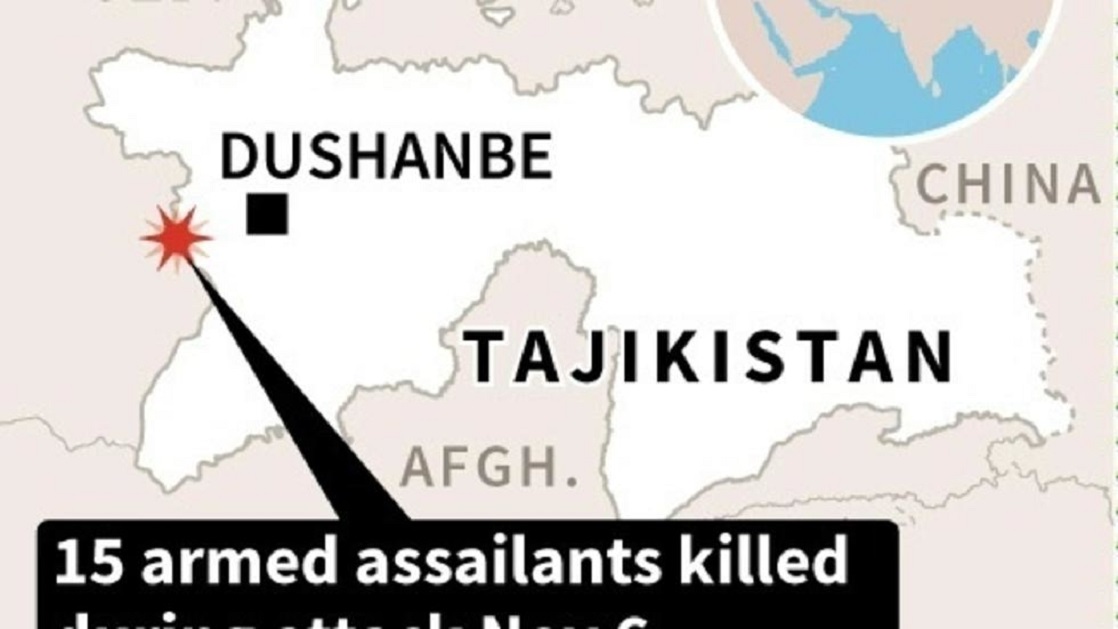In the night of 6 November 2019, a deadly attack on a Tajik outpost near to Uzbekistan’s border took place. According to the Tajik authorities, the clash between the attackers and security forces claimed 17 lives. Tajik authorities also claimed that these attackers belonged to Islamic state (IS).
Since assuming power, Tajik President Emomali Rahmon has claimed of sternly addressing the issues related to the terrorism and extremism. He even banned the single Islamism party of Tajikistan, Islamic Renaissance Party of Tajikistan (IRPT) in 2015 indicting their involvement in anti-state activities. However, this incident describes a different story regardless of claims made by Tajik Government. Border Guard Service of Tajikistan told that, assailants came from Qalai Zol district of Afghanistan’s Kunduz province from where they crossed the border in Qubodiyon district of Khatlon province in Western Tajikistan.1 This part of Tajik-Afghan Border is porous because it is under control of Taliban.
Fifteen attackers and two government security personnel including a border guard and an officer of Tajik Interior Ministry were killed in the fighting, and according to varying sources at least four or five men have been detained. IS has not claimed the responsibility for the attack till November 8, 2019. The SITE Intel Group2 reported that the Islamic State, through its Amaq News Agency had claimed the responsibility for the attack. According to the IS statement, “its attackers continued to clash with the Tajik security forces until all its participants were killed, and that came after killing at least 10 Tajik soldiers, and wounding others, and destroying several vehicles, as well as causing significant material damage to the border post”.3 The Tajik Security agency GKNB has narrated a different story based on the statement produced by the arrested assailants. According to GKNB and Interior Ministry of Tajikistan, they have killed 15 attackers in a firefight and captured five. These attackers came in four vehicles and one among them was a women.
Afghan authorities have refuted the claims made by Tajik interior Ministry that the attackers came from Kunduz Province. Afghan officials said that the stretch of the Afghan-Tajik border in the Qalai Zol district of Kunduz province is well guarded both from Afghan and Tajik side.4 However, New York Times published statement of one of the Afghan security official Mohammad Nabi Gochli, the local police commander, who told that the border between Afghanistan and Tajikistan in this area is porous due to Taliban control.5
Tajikistan, one of the poorest countries in Central Asia, has struggled to alleviate the risks of an ascending IS threat emerging from neighboring Afghanistan. This was not the first attack by IS attackers. In July 2018, an incident took place which was claimed by IS where four Western tourists were killed during a bicycling tour of the country. A group of attackers who pledged allegiance to IS took responsibility of killing them.6 In May 2019, another incident in which around 32 people were killed during a prison riot of which, 24 were IS members. The rioters had initially stabbed several guards and taken other prisoners hostage.7 These incidents portray a clear picture of emerging threats of increased IS activities in South and Central Asian region.
Russia and China are the biggest stakeholders in Central Asian security framework. Deteriorating security situation will have serious repercussions for both of them. Central Asian neighbours of Tajikistan, especially Uzbekistan and Kyrgyzstan have serious intimidation of looming dangers to their respective borders. Recently, USA has claimed killing of head of IS’ Abu Bakr al-Baghdadi which will trigger some fresh impetus to the activities of this terror group especially in most vulnerable areas such as Afghanistan and Central Asia.
Tajik authorities needs to more vigilant while safeguarding their territory from these external threats. Moreover, Tajikistan, by diverging its security interests with other regional players such as India can have certain leverages. India and Tajikistan share the common security challenges, and therefore, collaboration in this sphere would be beneficial for both countries. This incident bears more security concerns as Tajik President Emomali Rahmon is on an official trip to Europe till November 12 and that it has coincided with Tajikistan’s Constitution Day.8
Endnotes:
- ‘The majority of persons attacking frontier post in Roudaki district are nationals of Tajikistan, says Interior Ministry, Asia Plus, 8 November 2019. https://asiaplustj.info/en/news/tajikistan/incidents/20191108/the-majority-of-persons-attacking-frontier-post-in-roudaki-district-are-nationals-of-tajikistan-says-interior-ministry
- 'Amaq Releases Posthumous Video Of Ishkobod Border Post Attackers Pledge To "Caliph" Abu Ibrahim’, Site Intelligence Group, 8 November 2019. https://ent.siteintelgroup.com/Statements/amaq-releases-posthumous-video-of-ishkobod-border-post-attackers-pledge-to-caliph-abu-ibrahim.html
- ‘As ever, Tajikistan responds to bloodshed with obfuscation’, Eurasia Net, 8 November 2019. https://eurasianet.org/as-ever-tajikistan-responds-to-bloodshed-with-obfuscation
- ‘Afghanistan denies statement that assailants crossed into Tajik territory from Kunduz as unfounded’, Asia Plus, 8 November 2019. https://asiaplustj.info/en/news/tajikistan/incidents/20191108/afghanistan-denies-statement-that-assailants-crossed-into-tajik-territory-from-kunduz-as-unfounded
- Thomas Gibbons-Neff and Najim Rahim, ‘ISIS Fighters Attack Outpost in Tajikistan’, The New York Times, 6 November 2019. https://www.nytimes.com/2019/11/06/world/asia/isis-tajikistan.html
- ‘Many dead in Tajikistan 'firefight with IS’, BBC News Asia, 6 November 2019. https://www.bbc.com/news/world-asia-50315100
- ‘Tajikistan: 17 killed in border outpost attack’, DW News, 6 November 2019. https://www.dw.com/en/tajikistan-17-killed-in-border-outpost-attack/a-51129060
- Putz Catherine, ‘More Questions than Information on Tajikistan Border Post Attack, the Diplomat, 6 November 2019. https://thediplomat.com/2019/11/more-questions-than-information-on-tajikistan-border-post-attack/
(The paper is the author’s individual scholastic articulation. The author certifies that the article/paper is original in content, unpublished and it has not been submitted for publication/web upload elsewhere, and that the facts and figures quoted are duly referenced, as needed, and are believed to be correct). (The paper does not necessarily represent the organisational stance... More >>
Image Source: https://s.france24.com/media/display/5b75f7a0-0082-11ea-9dd8-005056bff430/w:980/p:16x9/9dd7f95ebe84bd11dedf188369823ca2404ada9b.jpg










Post new comment